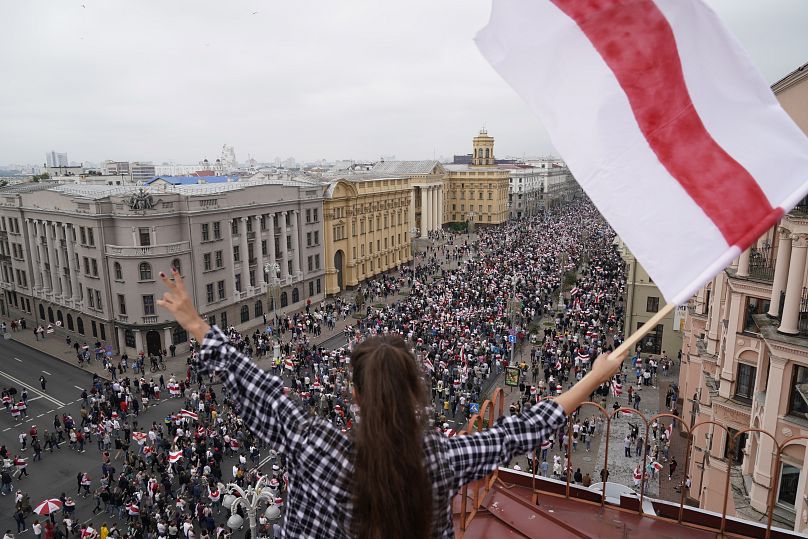Exactly six months on from Belarus' disputed presidential election, what is the current state of play?
Six months on from Belarus' disputed presidential election, protesters continue to take to the streets in weekly demonstrations demanding the resignation of Alexander Lukashenko and a new vote.
 ADVERTISEMENT
ADVERTISEMENT
 ADVERTISEMENT
ADVERTISEMENT
The leader, dubbed "Europe's last dictator", has overseen sweeping crackdowns on the demonstrators with swathes beaten and arrested, while his most prominent political opponents have been jailed or forced to flee the country.
Numbers at rallies have been dwindling in recent months and pressures that the leader faced when he announced a meeting of the all-Belarusian People's Assembly this week on February 11 and 12 to discuss constitutional reforms have eased.
Could constitutional change really be afoot in Belarus and how did we get here?
What has happened since the disputed presidential election?
A lot has happened since the presidential election on August 9, 2020.
After Lukashenko was declared the winner with 80% of the vote, European nations expressed doubts about the result, while the EU itself demanded a recount of the ballots.
Svetlana Tikhanovskaya, officially given a 10% vote share, claimed victory and called on Lukashenko to step down. She later fled the country for Lithuania citing her own wellbeing and that of her children for the "very difficult decision".
She has since campaigned publicly for a new election, recently being awarded the EU's Sakharov Prize for her efforts.
The exiled opposition leader named February 7 the Day of Solidarity with Belarus, calling on the global community, including leaders, journalists, activists, to support demonstrators.
Back in Belarus, the last six months have seen a movement with thousands of people protesting on a daily basis and demonstrations with crowds in their hundreds of thousands turning out at weekends.
Authorities have pushed back with a heavy-handed response — the Minsk-based human rights NGO Viasna recently said 33,000 people having been detained in Belarus since the beginning of the presidential campaign last May.
The crackdown also extended to the free press in Belarus, with violence against reporters and arrests seeing it labelled the most dangerous country in Europe for journalists in 2020, according to data from Reporters Without Borders (RSF).
Activists have also called out a series of recent high-profile media arrests as a "tactic to shut down the press".
At least nine journalists have had criminal justice proceedings opened against them since November, according to data RSF collected in coordination with the Belarusian Association of Journalists (BAJ).
What's happening this week?
Lukashenko had, back in December, announced the holding of a people's assembly on February 11-12, which he said will have representatives from all groups of Belarusian society, with the aim of changing the country's constitution.
But Lukashenko's circumstances have changed since then, according to Katia Glod, a Belarusian independent political analyst and a non-resident fellow at the Center for European Policy Analysis, a Washington-based think tank.
"There is a lot of uncertainty and ambiguity and it's not as certain as it was a few months ago that he (Lukashenko) will carry out constitutional reform," she said.
The regime hasn't released any official drafts for change and the idea seems to have died out, according to the expert.
She added one of the main drivers for constitutional change was the Kremlin, spurred on by the desire for the unrest not to spill over from Belarus into Russia and for the democratic opposition not to take power, but that pressure has now subsided.
Indeed, while discontent is still high in Belarus and protests are still a weekly occurrence, they are now more sporadic and disputed across the country rather than the hundreds of thousands who marched through Minsk last year — less of a worry to Moscow, according to Glod.
She cited the high levels of repression enacted by Lukashenko for the protests seeing numbers declining, as well as the cold winter weather in Belarus, which she said was a secondary factor.
Without the pressure from Russia and less of a direct need to quash demonstrations, the Belarusian political expert thinks the leader is most likely to use this week's assembly as a mouthpiece.
"In terms of reform, they (Lukashenko's regime) could try to use the assembly saying that it represents the whole of society - obviously all these people were very carefully selected by the security services - to say that society wants strong power," Glod said.
"That they want Lukashenko as their president and don't want to do make any constitutional changes."
There has also been speculation that Lukashenko might announce the assembly will have some sort of constitutional powers going forward, like the supreme decision-making Congress of the Communist Party during Soviet times.
In all, Glod says the likelihood of substantial constitutional reform or a constitutional reshuffle is low.
"In terms of legitimacy, he (Lukashenko) lost it and he's not going to gain it," she added.
"Lukashenko doesn't want reform because it would change the balance of power and the key forces pressuring him to do so have backed off."











